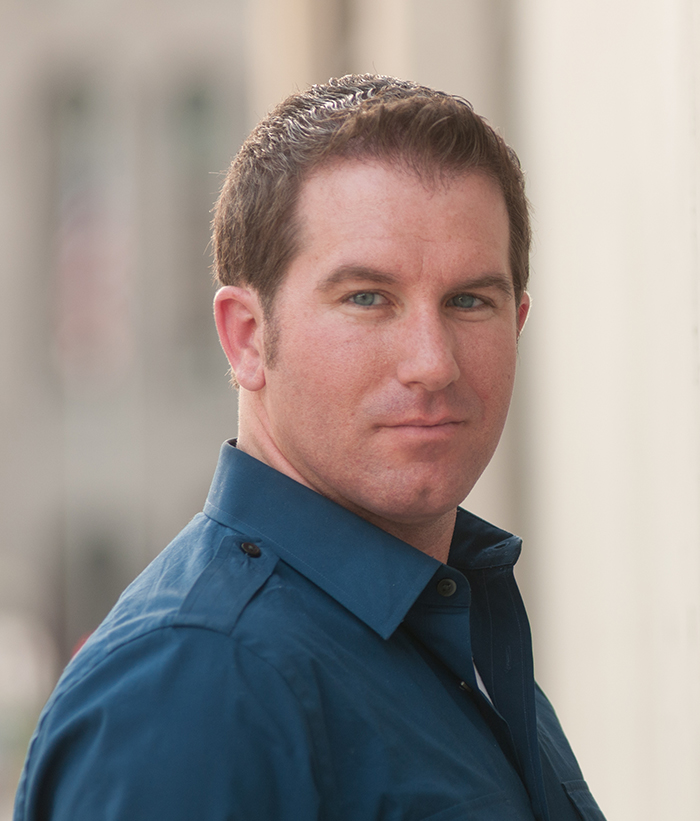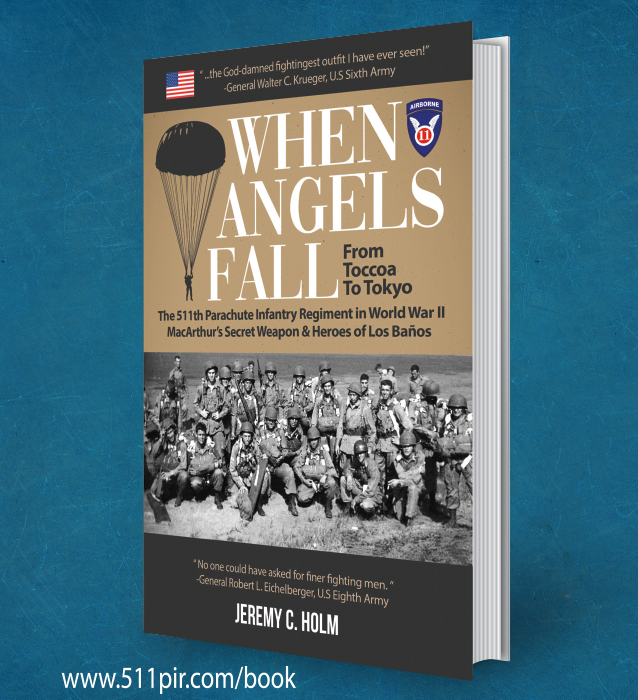
Jeremy C. Holm
Author & American athlete Jeremy C. Holm has spent over half his life in the fast-paced winter sport of bobsled, including as the Head Coach for the US Adaptive Bobsled Team. He has a degree in Journalism and is pursuing a degree in Military History at the American Military University. In addition to motivational speaking and corporate appearances around the world, Jeremy is the author of three books and spends his time camping, hiking, writing and trying to make history, one day at a time.
Prayers on a Mountaintop
Anyone who knows me knows that I love being outdoors. From hiking to camping, snowshoeing to four-wheeling, snowmobiling to boating to climbing to just exploring the hills or forests or mountains or rivers or lakes around me, God truly gave us a great world to live in.
Recently I had the opportunity to travel to Toccoa, Georgia to help honor my grandfather's World War II airborne unit, the 511th Parachute Infantry Regiment (www.511pir.com). Toccoa puts on a wonderful World War II Weekend every October and this year's (2021) event was simply amazing. From the USO dance at the local VFW to the community breakfast, the parade down Main Street complete with a mock street battle to a lovely banquet, plus a Sunday sunrise memorial service, a book signing event and beyond. Toccoa is a historic piece of American airborne history that does a great job of preserving and promoting that history.
While there, we took the opportunity to climb the famous "hill" known as "Currahee". If you are a fan of HBO's "Band of Brothers" miniseries, Currahee is the mountain that Easy Company runs "three miles up, three miles down." Easy Company's 506th Parachute Infantry Regiment was only one of four parachute regiments that formed at Camp Toccoa during World War II. Others included the 501st, 511th and 517th PIRs. My grandfather, 1st Lieutenant Andrew Carrico was a member of the 511th PIR and saw combat in the Pacific Theater. Many of his buddies that I've interviewed to write my acclaimed book WHEN ANGELS FALL: FROM TOCCOA TO TOKYO, THE 511TH PARACHUTE INFANTRY REGIMENT IN WORLD WAR II spoke of Currahee Mountain with groans and smiles. One even called it "that darn hill!"
I can see why! It is quite the climb and the grade runs pretty steep in some parts. But how wonderful and humbling it was to make the same trip that so many brave, young American soldiers made before they headed to Jump School at Fort Benning. Plus, the surrounding forest was incredible and the view from the top of Currahee is breathtaking! There is a grand majesty to be found on mountain and hilltops like Toccoa or Olympus or Timpanogos or any of the other dozens upon dozens of mountains I've climbed.
In the late 1700s, my ancestors settled near Roanoke, Virginia, smack dab in the middle of the beautiful Blue Ridge Mountains. Mountains are in my roots, which is why I feel so blessed to living in the middle of "the everlasting hills" of the Wasatch Range in Salt Lake City. But climbing Toccoa made me think of all the prophets in the scriptures that sought solitude in such hills and mountains in order to commune with God.
Mountains are often places where God speaks to his followers and they come back changed for the better. I've been reading through the Old Testament lately and admittedly, while I have read the New Testament and the Book of Mormon countless times, the Old Testament has been a tome of scriptures that I've rather skipped around in. I've studied the well-known stories like Daniel in the Lion's Den or David and Goliath or Elijah and the prophets of Baal, but I think the last time I read the Old Testament cover-to-cover was in junior high school for Seminary. According to some kids I know, that was when the dinosaurs roamed the earth (i.e. over twenty years ago).
But in my recent readings I have found so many gems and eternal truth that are incredibly strengthening. It has been a true joy to discover these wonderful stories and doctrines and words of deep eternal import that I've missed, including deeply moving accounts of the prayers of the followers of God through the ages. Not all were on mountaintops, but each experience left the pray-ee changed forever.
Moses was called to lead the Children of Israel out of Egypt while he was on Mount Horeb when God spoke to him through a burning bush (Exodus 3). And what marvelous experiences Moses had when he climbed Mount Sinai to speak with God face to face (Exodus 19-23) to learn God's will for his covenant people. How sad it is that most Christians focus so much on the Ten Commandments received on Sinai, but don't spend more time learning the other truths God taught Moses on that mountaintop. And all of this occurred because Moses was willing to answer God's call and to climb Mount Sinai to commune with him.
Another mountaintop experience occurred when Elijah sought the Lord due to Israel's sins and wickedness in 1 Kings 19. The people had killed God's other prophets and the scriptures note that Elijah was "very jealous for the Lord God of hosts" (vs. 10). Jealous can be translated as "zealous", meaning Elijah desired to hear from God, to be close to him, to seek and obtain his help. As such, he was told to "Go forth, and stand upon the mount before the Lord" (vs. 11). What followed afterwards is a beautiful example of God's willingness to hear the prayers and cries of his people (vs. 15-18). Elijah was probably weary in body, mind and spirit. He had tried to correct the people's evil ways and had been forced to flew for his life. He wanted the people to repent, and in his hour of need he found God on the mountaintop.
And what about Nephi who lived during Old Testament times (around 600 B.C.) whose father likely knew the prophet Jeremiah? Upon reaching the land Bountiful on the seashore, Nephi says that "I... did go into the mount oft, and I did pray oft unto the Lord; wherefore the Lord showed unto me great things" (1 Nephi 18:3). What a testament to understanding God's mercy and kindness and willingness to hear our prayers! I believe that Nephi was inviting us to have similar experiences with God through prayer when he testified that "he hath heard my cry by day, and he hath given me knowledge by visions in the night-time." (2 Nephi 4:23).
God himself has said, "Then shall ye call upon me, and ye shall go and pray unto me, and I will hearken unto you." (Jeremiah 29:12). Indeed, the invitation to "seek" God is perhaps the most oft-repeated invitation in scripture. The examples of the prophets finding God in the mountains is testament to the fact that God wants to be found. In your own personal scripture studies, I challenge you to look for examples of those who sought God and found him in multitudinous ways. You will be amazed and strengthened by the sheer number of times that followers of God have sought and then found him.
I believe that each of us can have the same life-changing experiences, whether it by on a mountaintop, in our quiet bedroom, in the temple "the mountain of the Lord's house", sitting in church, in the office, in a hospital room, or wherever we may be. We may seek him because of a desire to be close to him, or because we are worried about some trouble in our lives or because we want his forgiveness or guidance.
When I was on top of Toccoa's Currahee Mountain, I said a silent prayer of thanks to God for letting me climb the same mountain that so many of my grandfather's buddies had. I cannot fully describe it, but I felt that both He and they were grateful for my efforts to honor their legacy and share their story with the world. I can testify before Him as Abraham that, "Thy servant has sought thee earnestly; now I have found thee” (Abraham 2:12).
So, seek Him. Turn to Him in prayer. Kneel down, bow your head, close your eyes and open your heart to Him. You WILL find Him.
God Bless the Pathfinders
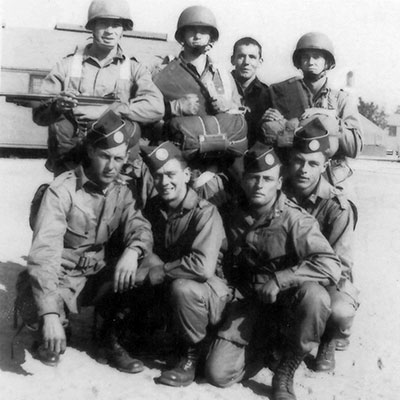 As many of you know, I have been lucky enough over the past decade to study in-depth my grandfather's World War II unit, the 11th Airborne Division. Grandpa was a paratrooper in the famous 511th Parachute Infantry Regiment which formed at Camp Toccoa, Georgia, in the spring of 1942, then went on to train at Fort Benning, Camp Mackall, Camp Polk, Camp Stoneman then sailed to the Pacific Theater for additional training on New Guinea before being committed to combat on Leyte in late 1944 and Luzon for most of 1945.
As many of you know, I have been lucky enough over the past decade to study in-depth my grandfather's World War II unit, the 11th Airborne Division. Grandpa was a paratrooper in the famous 511th Parachute Infantry Regiment which formed at Camp Toccoa, Georgia, in the spring of 1942, then went on to train at Fort Benning, Camp Mackall, Camp Polk, Camp Stoneman then sailed to the Pacific Theater for additional training on New Guinea before being committed to combat on Leyte in late 1944 and Luzon for most of 1945.
I have had the great honor to interview and befriend many of the last living troopers from the 11th Airborne and I can tell you that they are (rightly) proud of having served their country in such a distinguished unit. To listen to these incredible men, now advanced in years, tell the stories of war from their youth, is humbling. That is why I have been working so hard to share their history on the regimental website www.511pir.com and it is the main motivation behind my latest book, WHEN ANGELS FALL: FROM TOCCOA TO TOKYO, THE 511TH PARACHUTE INFANTRY REGIMENT IN WORLD WAR II, available on Amazon (in print and Kindle) or wherever military history books are sold.
Lessons from Lehi and Joseph Smith
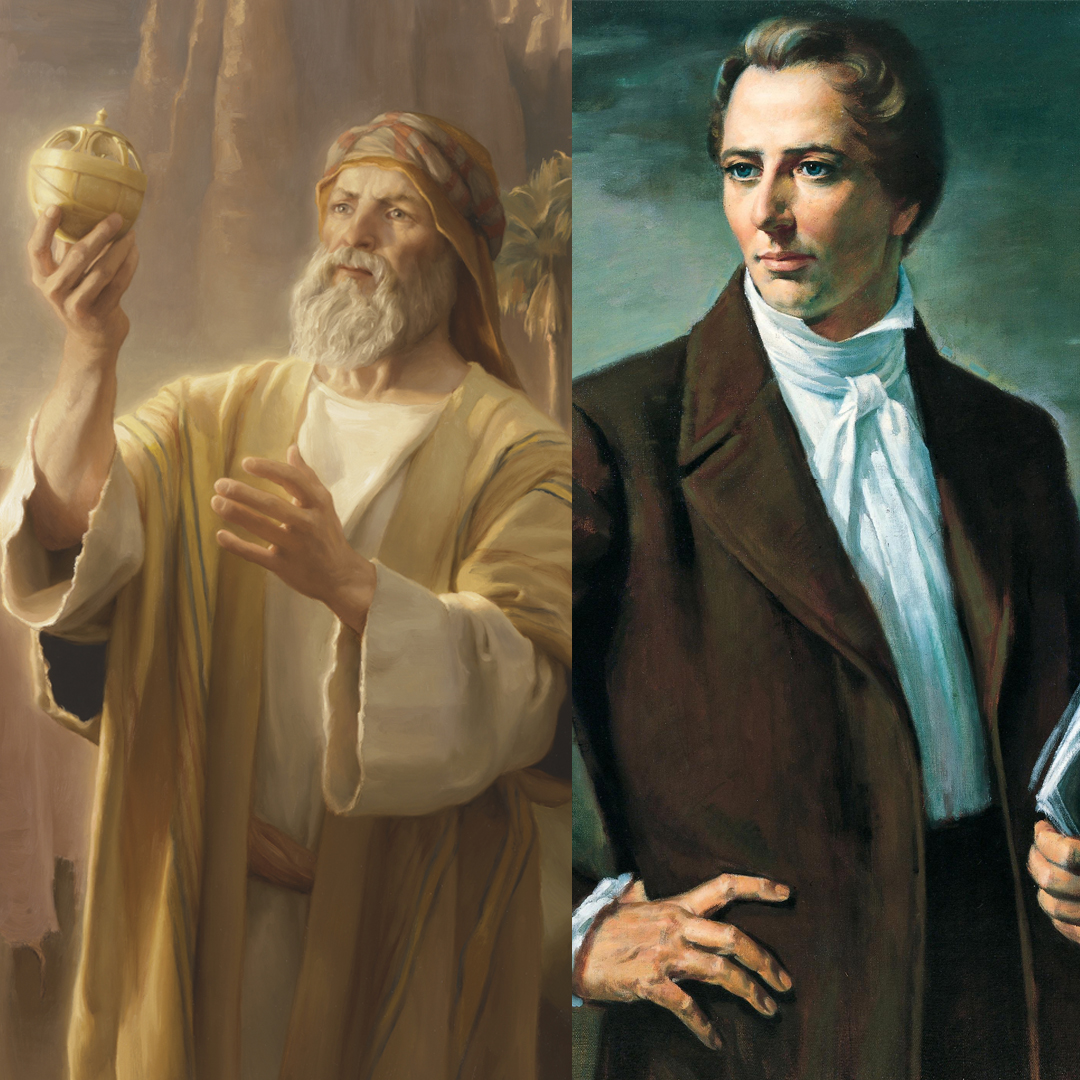 Recently, after binging a bit on The Church of Jesus Christ of Latter-day Saint's Book of Mormon videos, I decided to begin reading the Book of Mormon again with a fresh set of eyes. Like many of you, I have read through the Book of Mormon countless times, and while I had been reading towards the end of the book of Alma, something in Nephi's story called me back to those beloved words, "I, Nephi, having been born of goodly parents..."
Recently, after binging a bit on The Church of Jesus Christ of Latter-day Saint's Book of Mormon videos, I decided to begin reading the Book of Mormon again with a fresh set of eyes. Like many of you, I have read through the Book of Mormon countless times, and while I had been reading towards the end of the book of Alma, something in Nephi's story called me back to those beloved words, "I, Nephi, having been born of goodly parents..."
But as I was reading through Nephi's account, it wasn't his experiences that stuck out to me, at least not this time. It was his father's.
I think I've been guilty of seeing Lehi as kind of a background character that played an important part of the story, but was overshadowed by the brilliant light of Nephi's faith, obedience, patience, humility and strength. Oh, how wrong I was.
I never noticed it in any of my previous readings of the Book of Mormon, but Lehi was the Joseph Smith of his day (and the Nephite's dispensation). Let me explain that statement by analyzing just a few of the many similarities between Father Lehi and Brother Joseph. And when you finish this article, don't hesitate to message me with your thoughts about what I wrote. These comparisons have helped me understand both Lehi and Joseph to a greater degree and I am curious to see what you, dear reader, have to say.
When Storms Arise, Look to the Captain
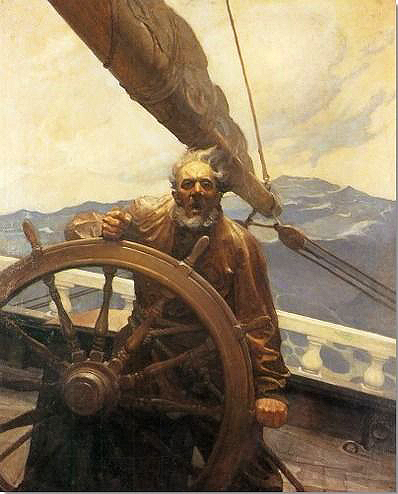 Several years ago my friends and I enjoyed an unforgettable 7-day cruise down to the Mexican Riviera. While not my first (or last) cruise, we had loads of fun onboard during the journey south to our first port of call, Puerto Vallarta. The weather was perfect as we toured the city's sites and my friends were impressed with my handle of the Spanish language due to my two-year mission to Honduras and Belize a few years earlier.
Several years ago my friends and I enjoyed an unforgettable 7-day cruise down to the Mexican Riviera. While not my first (or last) cruise, we had loads of fun onboard during the journey south to our first port of call, Puerto Vallarta. The weather was perfect as we toured the city's sites and my friends were impressed with my handle of the Spanish language due to my two-year mission to Honduras and Belize a few years earlier.
After everyone had purchased their desired souvenirs and knick-knacks we made our way back to the ship where we discovered some ominous news. When I turned on my cabin's TV, I noticed that the yellow spinning circle with wings to the northwest of us had turned red. The former tropical storm now had an official name as a hurricane. Even worse, it was tracking in nearly direct-east which meant that it would hit Cabo San Lucas the same day we were scheduled to be in port there.
That evening, conversations around the ship, especially in the dining areas, understandably focused on the storm's new status. The more worried (i.e. high-strung) onboard wondered what would happen if the storm did hit us while in port. What if there were dangerously high-winds or hail or water spouts or tsunami's or zombies or the apocalypse itself occurred?! I'm sure wills were double-checked, final letters home written and last meals devoured (or maybe that was just their normal cruising appetites).
Ok, maybe it wasn't that bad, but some people onboard were making it sound that bad. I admit I tried to stifle some grins as I heard some of the worries voiced aloud as we walked around the ship. Maybe it was because I had already been through two hurricanes (albeit on shore), one tornado (also on shore), three earthquakes + aftershocks, several tropical storms, and so on, but I wasn't really that worried. I knew just how strong cruiseships were made to be and how rigorous the safety guidelines are, but there was also one factor that all the worried cruisers ready to send out an S.O.S. were forgetting.
As I sat eating my breakfast the next morning, the familiar chime was overhead on the ship's Public Address system and the calm, reassuring voice of our captain explained the situation and reminded us of just how strong the ship was. He then went on to say that while our previously planned itinerary was going to be adjusted to avoid the storm, it was for our good and that we should all enjoy our time in Mazatlan that day.
I could see the relieved looks on faces around the Lido Deck and that day I was reminded of a very important lesson that would do us all well to remember at this unsettled time in the world:
When facing a storm, look to the captain.
The Storms in our Lives
2,000 years ago another group of water-bound travelers found themselves in a similar situation, although their small fishing boats were hand-made and the storm they faced came upon them so suddenly that there was no avoiding it. In Mark 4:37 we read, "And there arose a great storm of wind, and the waves beat into the ship, so that it was now full."
Among the disciples of Jesus, those now battling so fiercely to keep the water-laden ships afloat, were several experienced fishermen whom the Lord had called and ordained to become "fishers of men" (Mathew 4:18-22). But the humble apostles were neither searching for men nor fish, but rather for a way to survive the raging tempest.
As Elder Howard W. Hunter once explained, "The Sea of Galilee is quite low, about 680 feet below sea level, and the heat becomes quite great. The hills surrounding the water rise up very sharply and to considerable height. The cold air rushing down from the hills meets the warm air rising from the lake in such a way that sudden and temporarily violent storms can occur on the surface of that inland sea."
It was in the middle of such a storm that Jesus and his apostles found themselves, yet while his disciples labored with all their skill and strength to keep from drowning, their master was asleep on the ship's stern (Mark 4:38). That they loved him there is no question, but the stress of the situation must have been wearing on them. After all, the storm had been lashing their small ships for likely several hours. Whether all the disciples were with Jesus in the same ship or spread throughout the group is irrelevant, yet the author in me has always tried to imagine the battered disciples discussing the storm, then wondering among themselves how the Master could sleep through it all!
 When I look at the current state of the world, I wonder how many of us feel like we are in "a great storm of wind, and...waves..." which are beating "into (our) ship, so that it (is) now full."
When I look at the current state of the world, I wonder how many of us feel like we are in "a great storm of wind, and...waves..." which are beating "into (our) ship, so that it (is) now full."
With all the economic uncertainties, the physical distresses, the fears of illness especially from COVID-19 ("the Coronavirus"), the amount of jobs lost, the worries about food and medicines, the continued wars between countries and factions, the wide gulfs between political beliefs, the increased strains of parents who are trying to be provider and educator, the heartaches of those who have lost loved ones, the daily reports of earthquakes and hurricanes and fires and murders and so on, well... Does anyone else feel like they are battling to keep their ship afloat in the middle of the storm?
And perhaps, just perhaps, we may find moments where we wonder if the Lord is asleep, if he is too busy caring for others to care for us? Maybe the wind is rising, the rain is falling and the waves of anxiety or fear are crashing against the hull of our hope and faith. As we feel the heavy weight of loss or fear, maybe we, like the apostles of old, seek the Lord, crying out in our anguish through prayer, "Master, carest thou not that (I) perish?" (Mark 4:38).
Peace, Be Still
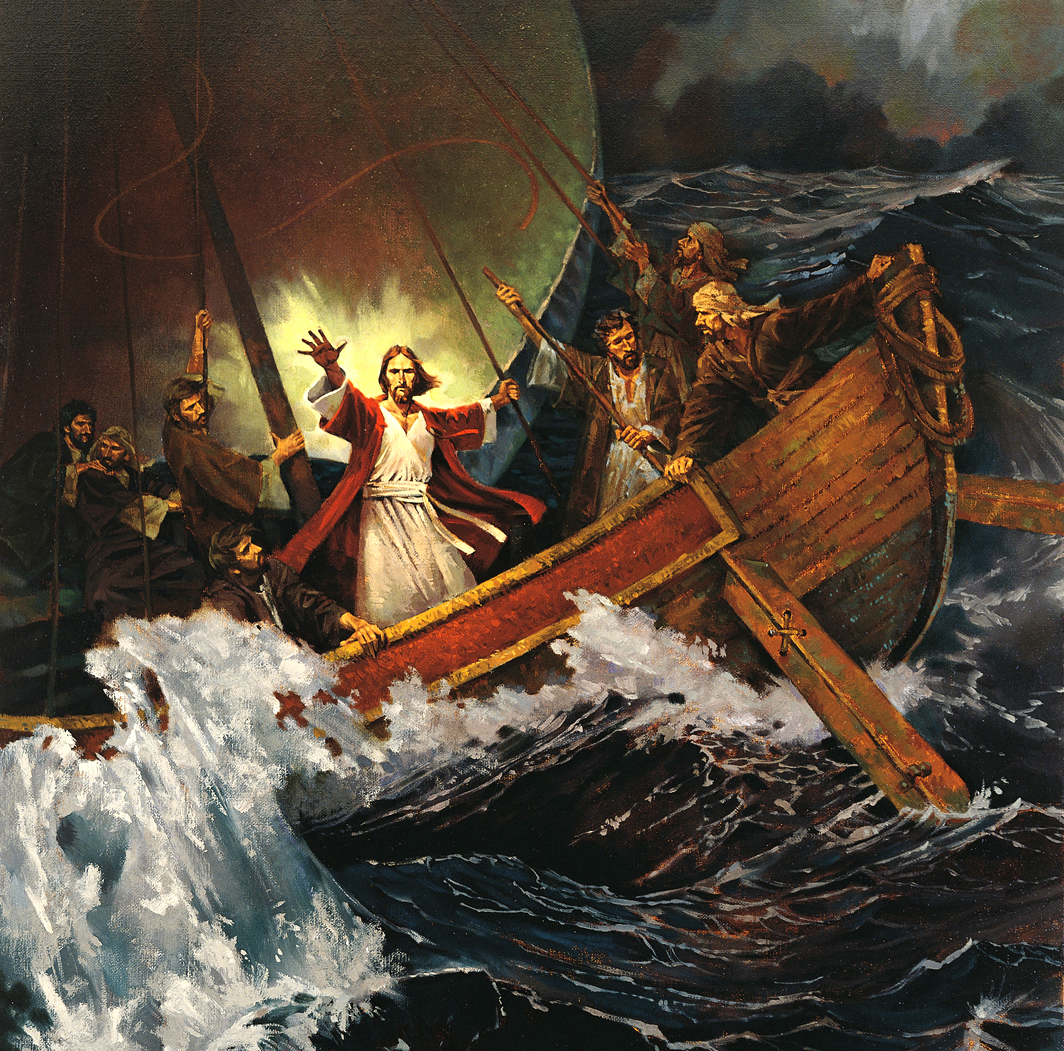 I think most of us have been through enough in life to know the answer to that question. We have experienced the agony of divorce or the heartache of heartbreak. We have cried more tears than we can count (but He can) over fears, sorrows and losses. We have clung to our faith like those disciples clung to the sides of the boat. We have labored with all our might to make it through the storms we have encountered along the voyage of life with enough long nights spent wondering if we really can survive the tempest.
I think most of us have been through enough in life to know the answer to that question. We have experienced the agony of divorce or the heartache of heartbreak. We have cried more tears than we can count (but He can) over fears, sorrows and losses. We have clung to our faith like those disciples clung to the sides of the boat. We have labored with all our might to make it through the storms we have encountered along the voyage of life with enough long nights spent wondering if we really can survive the tempest.
We have reached for God through prayer, fasting, service to others, scripture study, temple worship, journaling, and simply stretching our minds to find him.
And every time, in His own due time, the Lord stands and with his mighty hand declares, "Peace, be still. And the wind ceased, and there was a great calm." In this, our personal stories reflect the truths of the disciples' accounts, in that He had control over the storm the entire time.
And it may not be in this lifetime that we will fully understand why our trials and adversities and troubles came into our lives, but the Lord will still lovingly ask us the same thing: "Why are ye so fearful? how is it that ye have no faith?"
Perhaps His mighty command was not just to the sea, but rather directed towards the sailors, and to us: "Peace, be still."
Master, the Tempest is Raging
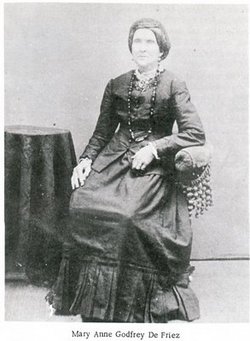 Most of us who believe in God have no doubt that this story is true, the Jesus Christ did indeed calm the storm on the Sea of Galilee.
Most of us who believe in God have no doubt that this story is true, the Jesus Christ did indeed calm the storm on the Sea of Galilee.
The real trick is to believe He can do the same for us.
After their parents died of tuberculosis, Mary Ann Baker-Godfrey de Friez (1822-1902), her sister and her brother continued to live together in Chicago, IL until her brother contracted the same disease. Mary Ann and her sister used what little money they had to send their brother to Florida in the hopes that the climate would ease his condition, but while his health initially improved, unfortunately their brother soon followed their parents in death.
Having spent all their money in sending him to Florida for recovery, the sisters lacked the funds and the health to travel south for the funeral nor bring their brother's body home for burial.
Mary Ann was heartbroken. She cried out in her own anguish, "God does not care for me or mine. This particular manifestation of what they call ‘divine providence’ is unworthy of a God of love. I have always tried to believe on Christ and give the Master a consecrated life, but this is more than I can bear. What have I done to deserve this? What have I left undone that God should wreak His vengeance upon me in this way?”
When I look at how many in the world today are cursing God for their losses or raising their first towards the Heaven in displeasure with the way their lives are going, I wonder how many could repeat Mary Ann's words verbatim.
But God had not forsaken the Bakers. As He does in our lives, the same Master who calmed the Sea of Galilee sent daily blessings to calm the troubled seas in Mary Ann's heart. She later wrote, "I became wickedly rebellious at this dispensation of divine providence. I said in my heart that God did not care for me or mine. But the Master’s own voice stilled the tempest in my unsanctified heart, and brought it to the calm of a deeper faith and a more perfect trust."
Though she had faced the storm, Mary Ann knew as I knew when facing the hurricane in Mexico, that when storms arise, look to the captain of the ship.
And because she was willing to look to the Captain of our Souls, Mary Ann later penned the magnificent hymn, "Master, the Tempest is Raging."
Though her heart had grown fearful and bitter with her brother's loss, this faithful woman wrote with with a grateful and changed heart:
Master, the terror is over.
The elements sweetly rest.
Earth’s sun in the calm lake is mirrored,
And heaven’s within my breast.
Linger, Oh, blessed Redeemer!
Leave me alone no more,
And with joy I shall make the blest harbor
And rest on the blissful shore.
Peace - Be of Good Cheer
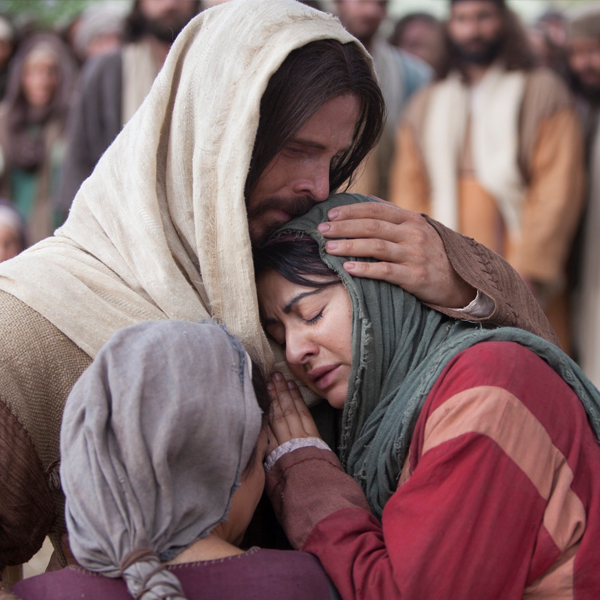 I do not know what tempest you are facing in your life at this time. Maybe it is the loss of a job or some illness or perhaps you are feeling overwhelmed by loneliness or the demands of life or the pains of perceived inadequacies.
I do not know what tempest you are facing in your life at this time. Maybe it is the loss of a job or some illness or perhaps you are feeling overwhelmed by loneliness or the demands of life or the pains of perceived inadequacies.
If you feel the waves of sorrow, fear, pain or even sin crashing against the hulls of your soul, may you remember the words of the Savior who said, "In the world ye shall have tribulation: but be of good cheer; I have overcome the world." (John 16:33.) He has the power to calm both the storm, and the sailor.
If you are craving peace for your storm-filled life, hold fast to the Lord's words when he said, "Peace I leave with you, my peace I give unto you: not as the world giveth, give I unto you." (John 14:27.)
Even if you feel your life, or faith, is too broken, remember that the resurrected Lord's first words to his disciples were, “Peace be unto you.” (John 20:19.)
Peace. Be of good cheer. I feel that those five words are exactly what the world needs right now. We need to remember that "the Lord is God" (Joshua 22:34) and that "even the wind and the sea obey him..." (Mark 4:41). And while he was speaking of Rome's naval power, Cicero spoke an eternally comforting truth when he said, "He who commands the sea has command of everything.”
My beloved friends, no matter what storms come your way, "Be still and know that (He is) God....The Lord of hosts is with us; the God of Jacob is our refuge."
As Mary Ann Baker wrote, "Whether the wrath of the storm-tossed sea or demons or men or whatever it be, no waters can swallow the ship where lies the Master of ocean and earth and skies. They all shall sweetly obey [his] will. Peace, be still!"
Amen.
LDS Living Piece: Sharing the Gospel at 90 MPH
 Jeremy Holm, team captain for Team Holm Bobsled, said he decided at a young age that bobsledding was his calling to share the Gospel in a very exhilarating and powerful way. At age 17 he was given the opportunity to ride in a bobsled and immediately found his life's passion. Taking only a two-year break from bobsledding to serve a mission in Honduras and Belize, this is his life and people can see it as soon as they meet him.
Jeremy Holm, team captain for Team Holm Bobsled, said he decided at a young age that bobsledding was his calling to share the Gospel in a very exhilarating and powerful way. At age 17 he was given the opportunity to ride in a bobsled and immediately found his life's passion. Taking only a two-year break from bobsledding to serve a mission in Honduras and Belize, this is his life and people can see it as soon as they meet him.
“Throughout the years I’ve had a lot of friends and family come up and watch me train or race, and they all say the same thing," Holm said, "they all say that I’m a totally different person, I’m so focused, that I’m more happy than I normally am. It’s like that place is my home.”
Many people would consider this a crazy and wild way to live life; however, Holm considers it a blessing and loves sharing it with everyone.
Salt Lake Tribune Piece: Athletes Share Dreams With Youth
 Four athletes visited the Murray Boys and Girls Club Thursday to inspire children to pursue their dreams in honor of the 9/11 National Day of Service and Remembrance. The athletes, including two Olympians, are part of Athletes for Hope, a national group that encourages members to give back to their communities.
Four athletes visited the Murray Boys and Girls Club Thursday to inspire children to pursue their dreams in honor of the 9/11 National Day of Service and Remembrance. The athletes, including two Olympians, are part of Athletes for Hope, a national group that encourages members to give back to their communities.
"I think, for us as athletes, representing the nation is a great feeling, and I think, in some ways, we all realize the small part we can play in inspiring and helping others," said Jeremy Holm, a Utah native and professional bobsledder. "We think of the heroes from 9/11 — firefighters, police officers, service workers — we think of those heroes and the inspiration they gave to all of us, and I think, as athletes, we just do our best to give back."
Schooled Magazine: Bobsled Race is Golden for Students
 This month the world will watch as nearly 2,500 athletes from 85 countries compete in the XXth Olympic Winter Games held in Turino, Italy. Our eyes and ears will be fi lled with stories of success, and the agony of defeat. The wins and losses of athletes will become common speech in our everyday lives for those 16 days as they compete for Olympic glory in a country thousands of miles away from their homes.
This month the world will watch as nearly 2,500 athletes from 85 countries compete in the XXth Olympic Winter Games held in Turino, Italy. Our eyes and ears will be fi lled with stories of success, and the agony of defeat. The wins and losses of athletes will become common speech in our everyday lives for those 16 days as they compete for Olympic glory in a country thousands of miles away from their homes.
Athletes compete in the Olympics for many reasons. Opinions vary a great deal as to what those reasons are. Money, say some. Fame, say others. Only the athlete that represents his or her country can answer the question of their motive. We decided to get an insider’s view by talking to a local college-aged athlete, Jeremy Holm, who trains and competes for the United States in the sport of bobsled.
Deseret News Piece: Bobsled Race is Golden for Students
 Gov. Mike Leavitt's goal Saturday in the Governor's Cup Bobsled Race was to get more kids involved in Olympic sports like bobsledding.
Gov. Mike Leavitt's goal Saturday in the Governor's Cup Bobsled Race was to get more kids involved in Olympic sports like bobsledding.
Monte Mounga's goal was to get down the Utah Winter Sports track faster than Leavitt.They both got what they wanted.
Mounga, a Utah sponsor of Tongan bobsledders, told his bobsled coach, 17-year-old Jeremy Holm of Salt Lake City, that he wanted to beat the governor. Holm nodded in agreement. They climbed inside Roy High's school-built sled, traveled through a couple of mind-numbing turns at speeds over 40 miles an hour and finished in 36.88 seconds.
Good enough for the gold.
Daily Universe Piece: Holm Beats Mitt Romney & Governor Leavitt, 1999
 Gov. Michael Leavitt and new Salt Lake Organizing Committee President Mitt Romney met Saturday at the Utah Winter Sports Park in Park City to see who could move at faster speeds in a two-man bobsled.
Gov. Michael Leavitt and new Salt Lake Organizing Committee President Mitt Romney met Saturday at the Utah Winter Sports Park in Park City to see who could move at faster speeds in a two-man bobsled.
Although the Leavitt vs. Romney match was the most anticipated of the day, Mote Mounga stole the show from both of them. Mounga, a Utah sponsor of Tongan bobsledders, won the event with a time of 36.88 seconds. He was teamed up with Jeremy Holm, 17, of Salt Lake City.
The winning bobsled was designed and built by students from Roy High School. The sled built by Granite High finished second behind the team of Leavitt and Wooten. Romney and Heaton finished third, driving the Ben Lomond sled. Finishing fourth place was the South Summit bobsled driven by Robert Brems and Ryan Darton.
"I'm a Mormon" piece
 Hi I'm Jeremy Holm and I'm a Mormon
Hi I'm Jeremy Holm and I'm a Mormon
I'm a bobsled pilot, author, motivational speaker, graphic and web designer and disciple of Jesus Christ...
ABOUT ME:
Growing up in the fast-paced world of the winter sport of bobsled, my faith in Jesus Christ has been a constant reminder of what matters most. Standing out there on the cold ice, the Spirit has been a constant companion that has helped warm my heart and mind. I have been piloting bobsleds since 1997, but I have also graduated from college, served a full-time mission for the Church of Jesus Christ of Latter-day Saints, written a few books, coached some of the first Paralympic bobsled athletes in the world and much more. I grew up in the Church and am eternally grateful for the blessings that have come into my life through the knowledge and authority found therein.
To read more of Jeremy's work, you can order one of his highly-acclaimed books by visiting the Online Store to purchase signed copies or unsigned ones by purchasing a copy wherever books are sold.
Highlighted Posts
3 Thoughts for LDS Midsingles
18 September 2017 in LDS Midsingles 12776 hitsThey say that when the student is ready, the master will appear. Well, I am by no means a master;…
The Temple, a Refuge in the Storm
23 April 2015 in Faith-Based 12780 hitsWith all the recent excitement about the upcoming Payson, UT LDS Temple Open House (which looks amazing, by the way),…
2 Truths and a Lie
05 August 2013 in Blog 9601 hitsLast week on my Facebook we played the well-known game known as "2 Truths and a Lie". The object of…
Why Elder Holland's Talk Meant So Much
06 October 2013 in Mental Health 15047 hitsThis past Saturday, October 5, I had the opportunity to attend an anti-bullying event held in Salt Lake City, Utah.…
The Art of Failing Forward
27 May 2015 in Motivational 11354 hitsSeveral years ago (1997 to be exact) I found myself staring down the brand new Park City, UT 2002 Winter…
The Commandment You Break Daily (And Didn't Know It)
09 April 2015 in Faith-Based 14155 hitsThis past week we celebrated Easter, or Holy Week, and remembered the life, death and glorious resurrection of our Lord,…
You Are Not Broken
02 December 2013 in Motivational 13630 hitsSeveral years ago while sitting with a trusted friend we began to reminisce about high school. As I talked about…
Prayers on a Mountaintop
24 October 2021 in Faith-Based 41841 hitsAnyone who knows me knows that I love being outdoors. From hiking to camping, snowshoeing to four-wheeling, snowmobiling to boating…



